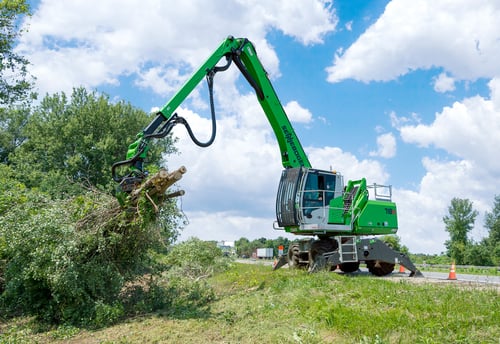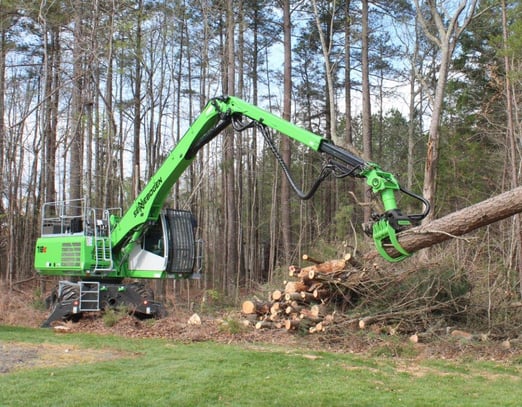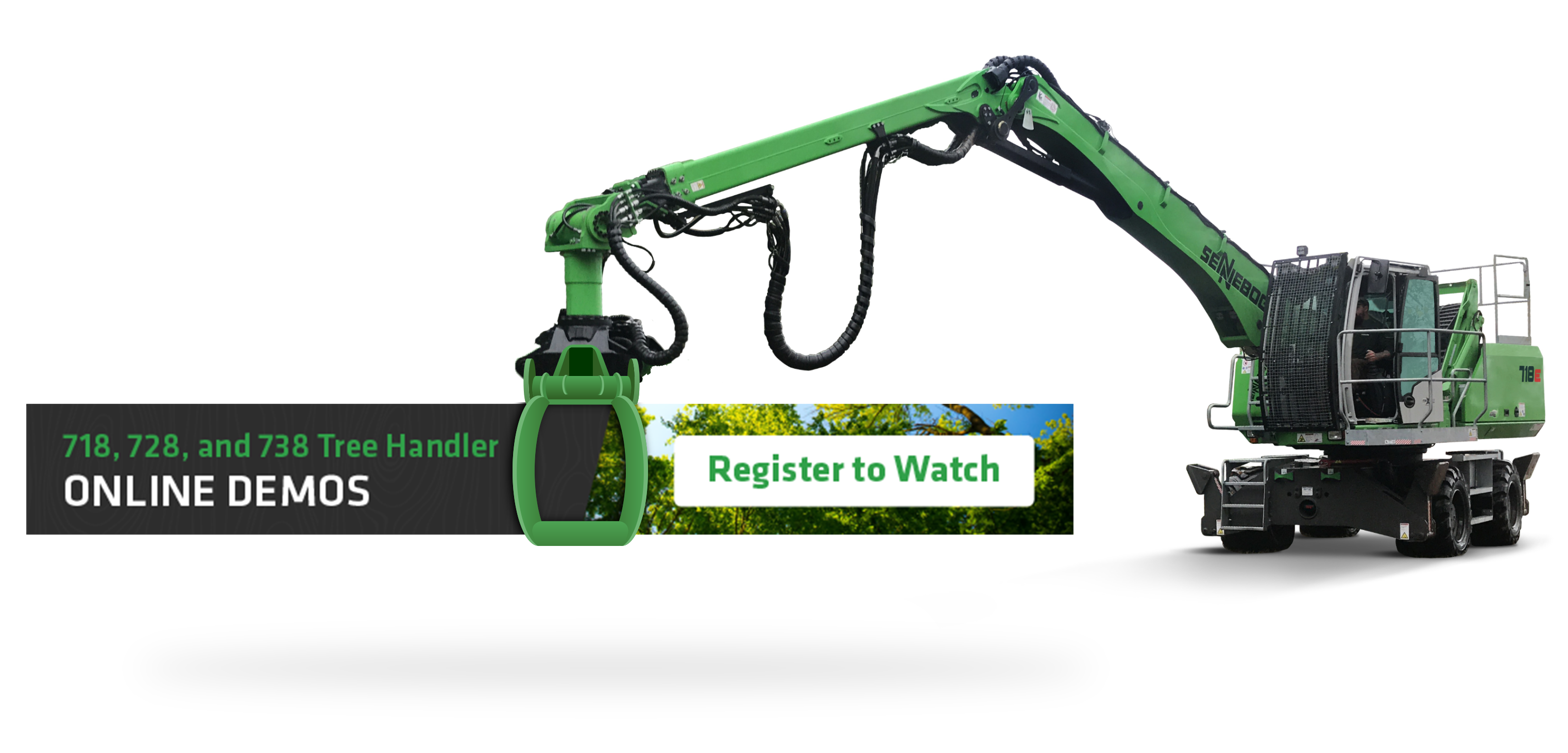
How much reach can I get?
That seems to be the question buzzing around in everyone’s ears. And while reach is an important factor to consider when it comes to tree care work, it’s important to recognize that stats don’t equal success.
Other things need to be considered, such as how stable the equipment is at max load, and how many booms are available to access tall or hard to reach trees.
Here, we’ll explore the many factors that go into effective tree service work when comparing a crane to a SENNEBOGEN.
Cranes in Tree Care
Both knuckleboom and straight boom (hydraulic) cranes have been used by arborists for tree care work for decades. Cranes can increase production, and many cranes can be customized to meet the buyers’ needs.
Many tree service businesses have well-trained, experienced operators and arborists who have an efficient system in place that includes transportation, machine stabilization, tree removal and take down, cutting, stacking, mulching, and hauling.
And while this system has worked rather well for many companies, it also has its drawbacks, including equipment limitations and safety issues.
Let’s explore the process of using cranes in tree care.
Knuckleboom Crane vs a Straight-boom (Hydraulic) Crane
Cranes are used to lift pieces of the tree up and away while cuts are being made in order to safely fell branches and trees to the ground.
They can move trees or tree parts safely to the ground in a 200-ft zone radius.
Crane operation takes a great amount of skill and concentration, and it’s highly recommended to receive a crane operating certification before using this equipment on the job site.
Crane Setup and Use
- Knucklebooms are equipped with stabilizers rather than outriggers.
- Cranes should only be used within the reach, max load and lift capacities recommended by the manufacturer.
Cranes are typically transported to a jobsite via truck chassis. A crane must be well-stabilized before work can safely begin. All tires must be in contact with the ground. It is important that the crane be completely level for max productivity and safety.
The on-site setup process for a crane is often very time-consuming, limiting productivity.
Crane Reach, Height and Size
While cranes are available with a reach of up to 120’, it’s important to understand that at such great heights, a crane has very little lifting capacity.
Some cranes can reach up to 120’ in height. This limits the lifting capacity and versatility of a crane and may require your crew to deploy additional equipment to effectively and safely get the job done.
When determining crane size, consider what job sites you typically service. Spend a lot of time with right of ways and highway maintenance? Storm cleanup and recovery? Removing trees from residential areas and landscaping jobs?
Job type, as well as geographical location and environment, help you determine the tree height you most commonly encounter. This can help you decide what crane height and size would work best for you.
Something to keep in mind is that what you lift must come down. So, while you may be tempted to go as big and high as possible to keep your options open, understand that height will impact your ability to lower trees and tree parts to the ground in some instances. For cases like this, shorter heights may be preferable.
Cab Control vs Remote Control
An important difference between knuckleboom cranes and straight-boom trucks is operator control.
Knuckleboom cranes have the feature of remote control, allowing the operator to stand at a safe distance during operation. This also allows the operator to find the best location for visibility.
Straight-boom trucks and cranes do not have a remote-control feature; rather, they are controlled from the cab.
Site Cleanup and Debris Removal
While a crane can be an effective, albeit time-consuming way to remove tree parts or cut down a tree, it doesn’t help with any of the work that has to be done after the removal process.
If your crew plans to cut, stack, mulch or mow after the land is cleared, you’ll need additional equipment to do so.
Some tree service attachments are available for some cranes, which offers more versatility without having to purchase an additional machine.
Attachments
Crane versatility increases with the ability to change out attachment heads. What attachments are available for a knuckleboom crane?
- Man Basket: Increases maneuverability. Eliminates need for a second truck and truck-mounted aerial lift.
- Grapples: Add the functionality to load wood and brush.
- Grapple Saw: Make cuts from the tree without additional personnel on the ground or in the tree.
SENNEBOGEN Tree Care Machines: Purpose-built for Tree Work
When we designed our tree handlers, we asked the experts in the tree care industry what they needed.
What were their biggest challenges?
How might we improve productivity?
How can we keep your workers safe and prevent burnout and fatigue?
We researched, designed, tested, and repeated the process again and again until our machines met every requirement and expectation of our tree service industry workers.
SENNEBOGEN tree handlers were designed to offer you everything you need to complete a job from start to finish with a single machine.
SENNEBOGEN Setup and Use
Both the rubber tire models and tracked models offer stability built into the undercarriage, with high ground clearance and low ground pressure.
Equipped with outriggers, with the option to add additional stabilization through a stabilizer blade or tracks.
SENNEBOGEN Reach and Lifting Capacity
We often get asked about reach, and there is no short, quick answer to this question. While reach is one factor to consider, reach doesn’t determine productivity.
Describing a SENNEBOGEN’s versatility might paint a better picture for you:
With its cutting and handling capability, the 718 eliminates tree climbing from the job as well as any need to rig ropes to the trees or to haul cut limbs to a sorting area. There’s no concern about branches or equipment falling on crew members below. With a 3,700 lbs. (1,700 kg) lifting capacity at maximum horizontal reach, 43 ft. (13 m) and 12,000 lbs. at maximum vertical reach, 48 ft. (14.6 m), the 718 can cut and move the wood in larger sizes as well, allowing faster removal. The grapple saw can even, if wanted, cut branches and feed them into a chipper in a single motion.
Read more about the 718 R-HD E Crawler model production and versatility here.
The 718 E model is our most popular tree handler. It’s small and versatile and takes care of 90% of tree service workers’ jobs.
As mentioned earlier, cranes have up to 120’ in reach but are vastly limited in their lifting capacity at such great heights.
We’ve designed our tree handlers to offer a maximum lifting capacity at reach, making our machines the most versatile for tree care service work.
SENNEBOGEN 718
Reach: 43’ Max load: 3,700 lbs.
SENNEBOGEN 728
Reach: 65’ Max Load: 3,700 lbs.
SENNEBOGEN 738
Reach: 75’ Max load: 3,700 lbs.
MaxCab Control (Boom and Stick)
Our elevating, tilting MaxCab features joystick steering and a safe, unobstructed view for the operator to conduct his business. This makes operations extremely safe and minimizes the number of crew on the jobsite, further increasing safety and preventing operator and arborist fatigue and burnout.
The operator can easily maneuver the boom and stick with the ultra-responsive joystick. The maximum visibility and additional cameras optimize productivity while minimizing risk to crew members.
Operator View: Large bulletproof glass front window and skylight. Standard equipped with a 2-camera system for complete site visibility.
There’s absolutely no need for additional crew on the ground or in the tree.
Read more about the MaxCab features here.
Site Cleanup and Debris Removal
One of the advantages of SENNEBOGEN is that we purpose-build our machines for every stage of the job. This includes the post-cut down and tree removal stage.
Once the tree has been felled or the branches have been removed, cleanup begins. Having the ability to cut tree parts down into more manageable sizes, stack them in piles for loading and haul away, or mulch and mow on-site offers a huge advantage in saving time, improving safety and being more productive. That’s the SENNEBOGEN advantage.
“No other machine does what we do AFTER the tree is down. Cut to length, stack, load, chip.
Most accidents happen on the ground after the tree is down (lower-level guys on the ground).
90% of those incidents are eliminated with SENNEBOGEN.”
-Greg Roberts, SENNEBOGEN NA Tree Care Manager
Attachments
The SENNEBOGEN tree handler interchangeable attachments provide a complete toolkit for every specialization needed.
With ONE dedicated SENNEBOGEN machine, you can do the work of 2-3 different machines.
Attachment heads currently available for the SENNEBOGEN 718 tree handler include:
- Grapple Saw
- Tree Shearer
- Mulcher
NEXT UP: Read more about the different attachment heads available here.

Overall Versatility and Production are Increased up to 10-Fold
There are a multitude of equipment outfitting options for tree care industry work. Throughout the years, savvy arborist and tree service owner-operators have customized their machines to do what they need and have worked to make those jobs as safe and efficient as possible.
This demands a steep learning curve and expertly trained operators and arborists. Even then, the risk of accidents is greatly increased, plus job productivity is limited by the scope of the machine.
We’ve built our SENNEBOGEN tree handlers with YOUR needs in mind, and we like to think we’ve covered all the bases.
Jobsite transportation, efficiency, and safety are all vastly increased when you add a SENNEBOGEN to your fleet, and this is all done through the unmatchable versatility of our machines. All of this increases your productivity speed.
SPEED = REVENUE
If you’d like to see real-life models of our tree handlers at work, register to watch our live-action online demo.



.jpg?width=512&height=399&name=unnamed%20(94).jpg)
